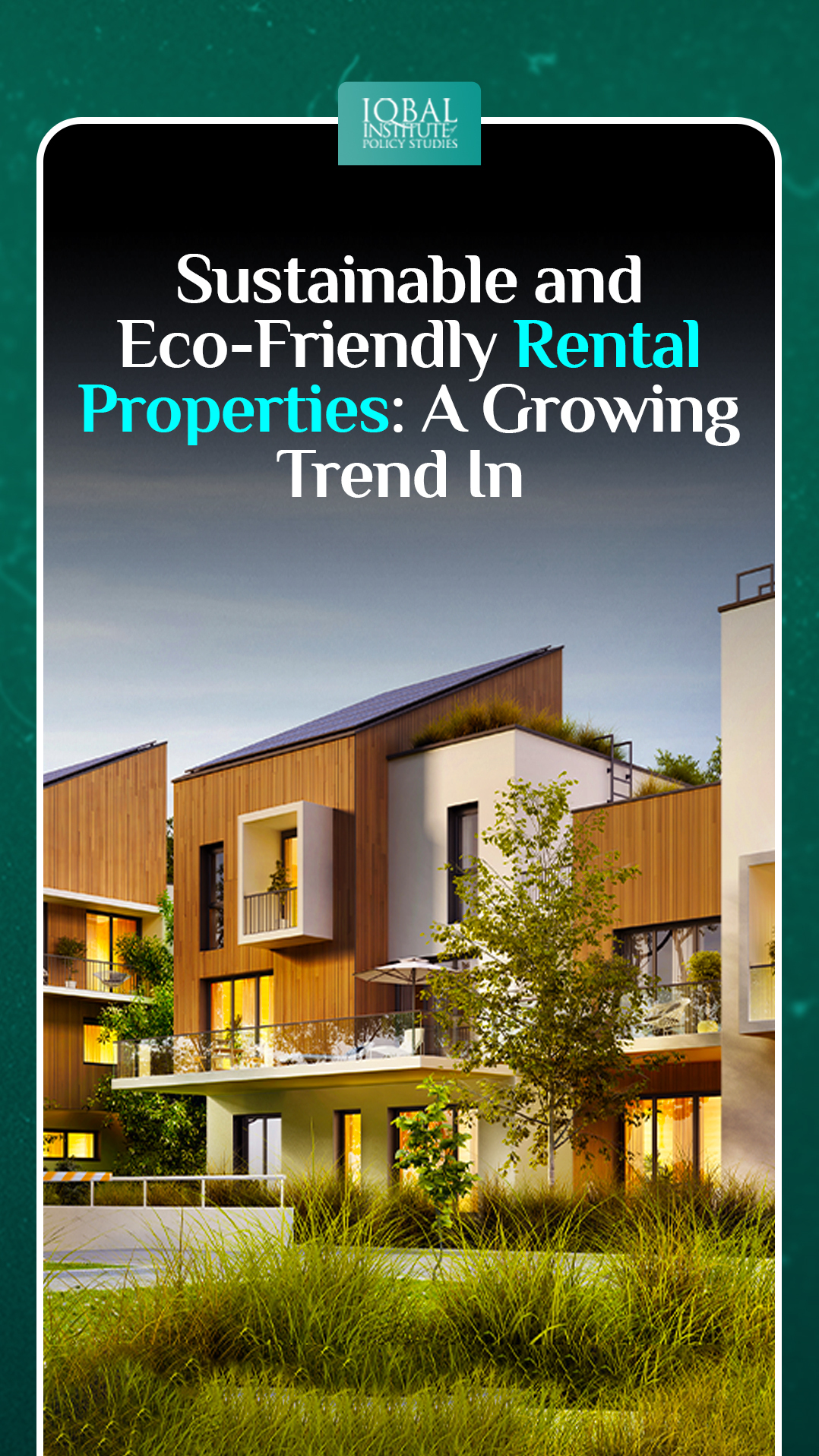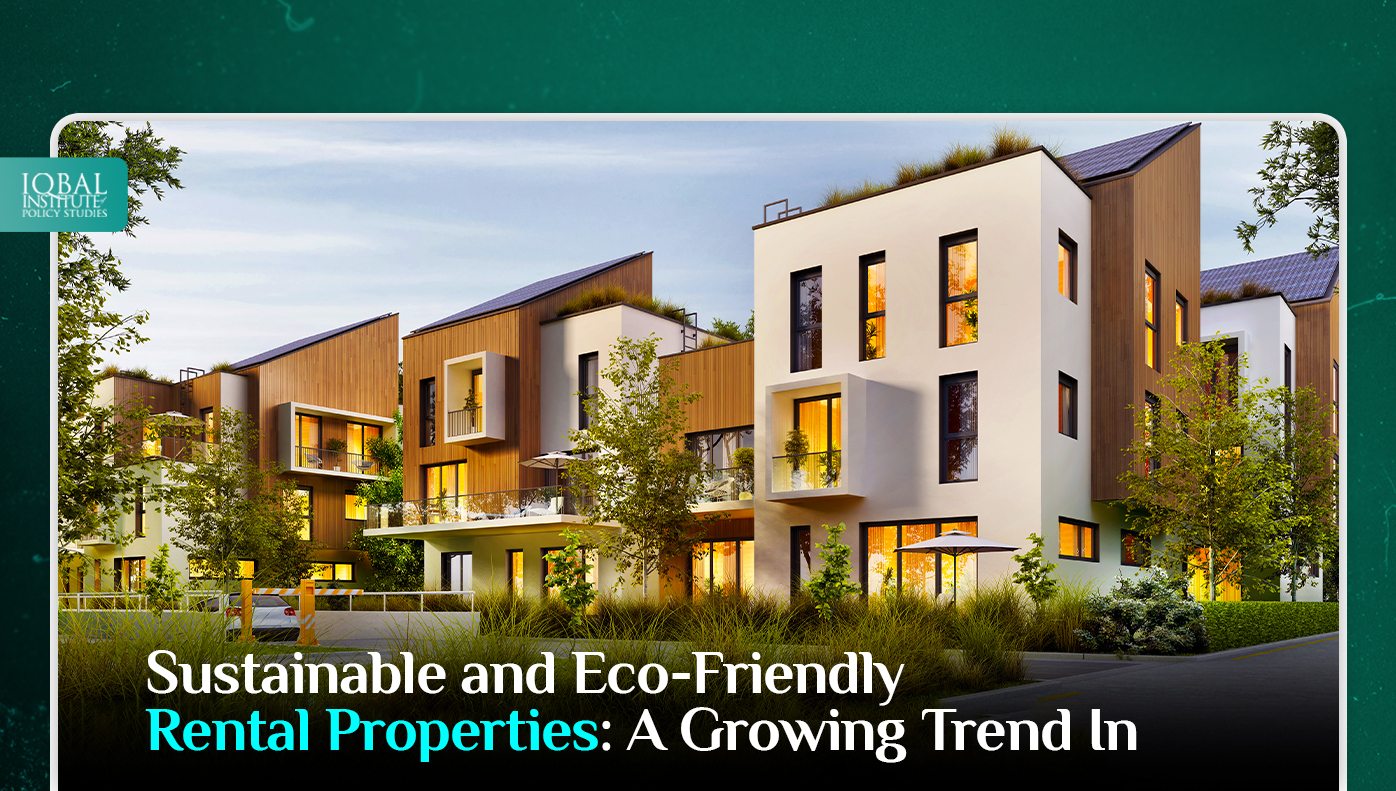As the world faces increasing environmental challenges, the importance of sustainable and eco-friendly practices has gained widespread recognition. This shift towards sustainability has also impacted the real estate sector, with a growing trend of eco-friendly rental properties emerging in various parts of the world, including Pakistan. In this blog, we will explore the concept of sustainable rental properties, their significance in the context of Pakistan, the benefits they offer, the challenges involved, and how this emerging trend is shaping the future of the real estate market in the country.
The Need for Sustainable Rental Properties in Pakistan
Like many other countries, Pakistan is facing environmental challenges such as climate change, pollution, deforestation, and resource depletion. These issues have prompted a call for collective action to adopt sustainable practices across various industries, including real estate. The housing sector is one of the significant contributors to greenhouse gas emissions, energy consumption, and waste generation. As such, there is a growing need for eco-friendly rental properties that minimize their environmental footprint while providing a comfortable living space for tenants.
Key Features of Sustainable Rental Properties
Sustainable rental properties in Pakistan encompass various eco-friendly features to reduce energy consumption, conserve water, promote waste reduction, and utilize renewable resources. Some key features include:
Energy-efficient design
Sustainable rental properties are designed to maximize natural light, ventilation, and insulation, reducing the need for artificial lighting and heating or cooling systems.
Renewable energy sources
Integrating solar panels and other renewable energy technologies to generate electricity and decrease dependence on traditional fossil fuels.
Water conservation
Installation of water-efficient fixtures, rainwater harvesting systems, and greywater recycling to minimize water wastage.
Waste management
Implement waste segregation and recycling systems to reduce the amount of waste sent to landfills.
Green building materials
Use environmentally friendly materials, such as recycled or locally sourced products, with a lower carbon footprint.
Sustainable landscaping
Incorporation of native plants, green spaces, and eco-friendly landscaping techniques to reduce water consumption and support local biodiversity.
The Benefits of Sustainable Rental Properties
The shift towards sustainable rental properties brings numerous benefits for both the environment and the property owners and tenants. Some of these advantages include:
Environmental impact
By reducing energy consumption, water wastage, and carbon emissions, sustainable rental properties contribute to a healthier environment and a greener future.
Cost savings
Though the initial investment in sustainable features may be higher, property owners and tenants can experience significant cost savings over time through reduced utility bills and maintenance expenses.
Health and well-being
Sustainable rental properties often prioritize indoor air quality, natural lighting, and non-toxic materials, promoting better health and well-being for occupants.
Tenant attraction and retention
With the rising awareness of environmental issues, eco-friendly rental properties have a competitive edge in attracting and retaining environmentally-conscious tenants.
Government incentives:
In some cases, the government may offer incentives or tax breaks to encourage adopting sustainable practices in the real estate sector.
Challenges in Implementing Sustainable Rental Properties
While the benefits of sustainable rental properties are promising, several challenges hinder their widespread adoption in Pakistan:
Initial costs
The upfront investment required for incorporating eco-friendly features can be a barrier for property developers, as it may increase construction costs.
Limited awareness
Lack of awareness about sustainable practices and their long-term benefits may deter property owners and tenants from embracing eco-friendly options.
Infrastructure limitations
In some regions, inadequate infrastructure, such as a lack of reliable water supply or access to renewable energy, can hinder the implementation of certain sustainable features.
Policy and regulation gaps
Clear policies and regulations of sustainable construction and rental properties may lead to consistent adoption across the real estate industry.
Market demand
While awareness of sustainability is growing, there might still be a limited market demand for eco-friendly rental properties, making developers hesitant to invest in such projects.
Case Studies: Sustainable Rental Property Projects in Pakistan
Despite the challenges, some pioneering projects in Pakistan have successfully integrated sustainability into their rental properties:
GreenHomes Lahore
GreenHomes is a notable eco-friendly residential project in Lahore, incorporating energy-efficient design, solar panels, and water-saving fixtures. The development has gained recognition for its sustainable approach and resident satisfaction.
EcoVista Karachi
Located in Karachi, EcoVista is a sustainable apartment complex featuring green building materials, rainwater harvesting, and efficient waste management practices, providing a model for future sustainable construction in the city.
Islamabad EcoRents
A unique project in the capital city, Islamabad EcoRents offers eco-friendly rental properties with innovative features like smart energy management systems and electric vehicle charging stations.
The Future of Sustainable Rental Properties in Pakistan
As the global focus on sustainability intensifies, the future of sustainable rental properties in Pakistan appears promising. The evolving preferences of tenants, increasing awareness about environmental issues, and potential government support through policies and incentives will likely drive the growth of eco-friendly rental properties. Additionally, advancements in sustainable technologies and building practices will make such projects more financially viable for developers in the long run.
Conclusion
The emergence of sustainable and eco-friendly rental properties in Pakistan signifies a positive step towards a greener future. These properties contribute to environmental conservation and offer economic benefits to property owners and tenants alike. While there are challenges to overcome, the collective efforts of the real estate industry, government, and society can foster the growth of sustainable practices in rental properties. As we move forward, the trend of eco-friendly rental properties is expected to gain momentum, setting a precedent for other sectors and inspiring a more sustainable way of living for future generations in Pakistan.
This article is written by Radma Nouman. Radma is a research analyst at the Iqbal Institute of Policy Studies (IIPS).



Leave a Reply